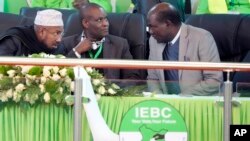At 09:00UTC Monday, Reuters reported that in official verified results reported by the independent and privately owned Nation Media Group, with 253 constituencies counted out of a total of 291, Ruto had 51% of the vote and Odinga 48%.
in official verified results reported by the independent and privately owned Nation Media Group, with 253 constituencies counted out of a total of 291, Ruto had 51% of the vote and Odinga 48%.
The Standard Group - likewise independent and privately owned - reported Ruto ahead, again with 51% of the vote against Odinga's 48% and also with 253 constituencies tallied.
A Reuters tally of 266 out of 291 preliminary constituency-level results at 0900 UTC on Monday showed Ruto on 52% and Odinga at 48%. Two minor candidates shared less than a percent between them.
Reuters did not include 20 forms in the count because they lacked signatures, totals, were illegible or had other problems.
At 09:30UTC Monday, Agencie France-Presse stated that Deputy Deputy President William Ruto was leading with slightly more than 51 percent of the vote against 48 percent for Raila Odinga, based on official results from more than 80 percent of constituencies, according to a tally published by the Daily Nation newspaper.
Reuters did not include 20 forms in the count because they lacked signatures, totals, were illegible or had other problems.
The preliminary tally is based on forms that are subject to revision if any discrepancies are discovered during the official verification process.
Ruto, 55, is deputy president but is effectively running as the challenger after outgoing President Uhuru Kenyatta threw his support behind his former foe Odinga, the 77-year-old veteran opposition leader making his fifth bid for the top job.
Both men had on Sunday appealed for calm as the wait for the final results of the August 9 vote dragged on.
The Independent Electoral and Boundaries Commission is under intense pressure to deliver a clean poll in a country regarded as a beacon of stability in a troubled region.
Polling day passed off largely peacefully, but memories of vote-rigging and deadly violence in 2007-08 and 2017 still haunt Kenyans.
Results must be issued by Tuesday at the latest, according to Kenya's constitution.
Kenyans voted in six elections, choosing a new president as well as senators, governors, lawmakers, women representatives and some 1,500 county officials.
Turnout was lower than expected at around 65 percent of Kenya's 22 million registered voters, with observers blaming disenchantment with the political elite in a country battling a severe cost of living crisis.
The IEBC had faced sharp criticism of its handling of the August 2017 poll, which in a historic first for Africa was annulled by the Supreme Court after Odinga challenged the outcome.
Dozens of people were killed in the chaos that followed the election, with police brutality blamed for the deaths.
Kenyatta went on to win the October rerun after a boycott by Odinga.
This report was compiled with information supplied by Reuters and Agence France-Presse
